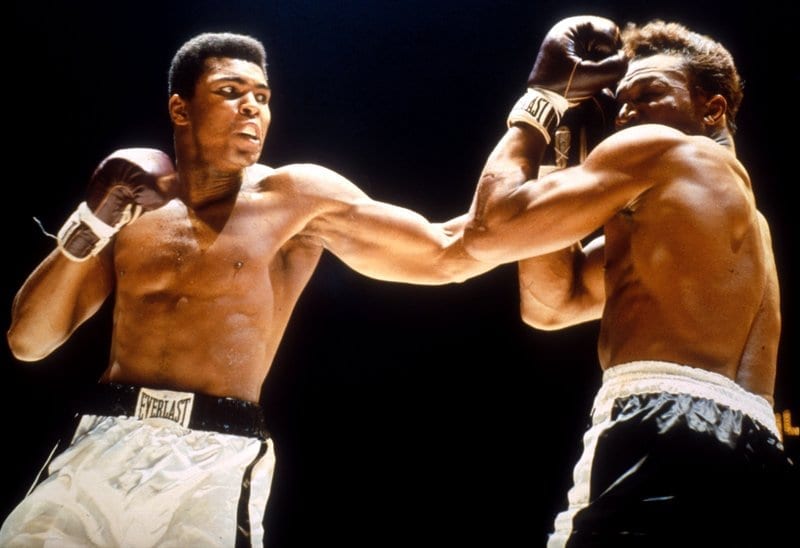Opinion: Muhammad Ali’s death marks loss of legend
The world lost one of its true champions when Muhammad Ali passed away on June 3, 2016.

Warning=NO CREDIT - DOUBLE FEE. Description=Houston, Texas, 16th November 1966.Champion Cassius Clay (later Muhammed Ali) lands a left to the head of challenger Cleveland Williams during the first round of their title fight. Caly defeated Williams with a TKO in the third round.Please credit POPPERFOTO.
The world has lost one of its greatest champions. On Friday, June 3, 2016, the legendary boxer Muhammad Ali passed away.
Ali had spent the past several days in a Phoenix hospital being treated for respiratory issues, after he was found barely breathing. He also battled Parkinson’s disease for over three decades.
After years of declining health, Ali had been robbed of his sharp tongue and his physique. What it could not take away, however, is his status as one of the true legends of boxing and of American culture.
Born Cassius Marcellus Clay Jr. in Louisville, Ky. on Jan. 17, 1942, no one was yet aware of the physical, cultural and charismatic force of nature that he would one day become.
Ali had humble beginnings. Clay was introduced early on to the unfortunate racism of the time.
His mother, Odessa Clay, saw the way this affected him.
“I remember one time when Cassius was small we were downtown at a five-and-ten-cents store. He wanted a drink of water, and they wouldn’t give him one because of his color. That really affected him,” she said.
From a young age, Ali began to form into the impactful man he was destined to become.
Ali was first introduced to the sport of boxing at the age of 12 by a Louisville police officer by the name of Joe Martin. Ali, still known as Cassius Clay at the time, reported to Martin that someone had stolen his bicycle. Martin told the young Clay that if he wanted to “whup” the thief, he would have to learn how to box first.
Learn is just what Ali did. As an amateur boxer, he amassed an astounding record of 100-5. Along with his sterling record, he won six Kentucky Golden Gloves titles, two National Golden Gloves titles and won a gold medal as a light heavyweight in the 1960 Olympic Games.
Clay made his professional debut on Oct. 29, 1960 with a decision victory. He would begin his career 19-0, and he had established himself as the No. 1 contender for Sonny Liston’s heavyweight title.
Liston went into the fight as a major favorite. Clay, already well known for his trash-talking ability, took it to another level in the pre-fight build for his showdown with Liston. Clay acted crazed at press conferences and appearances with Liston, knowing that the champion was afraid of crazy individuals. This fight is also where Clay’s most famous quote originates from.
“Float like a butterfly, sting like a bee. Your hands can’t hit, what your eyes can’t see.”
Clay would upset Liston to become the heavyweight champion. Soon after, Clay converted to Islam and changed his name to Muhammad Ali. He won his next nine fights, but after his victory over Zora Folley, his incredible career was put on hold.
Ali was selected by the draft to complete military service in the Vietnam War. But, citing his religious beliefs, he refused to go. In an era defined by the battle for civil rights and the fair treatment of all races of people, Ali became a true sports and cultural icon. His influence reached further than simply a boxing fan’s television. He was able to reach people from all walks of life, from rich to poor, men and women, and all races.
His refusal to fight brought him no small amount of hatred and disgust from many. Large numbers of people thought, “When your country calls you for duty, you answer.” Although many now despised him, Ali never wavered in his beliefs and convictions.
Ali was stripped of his passport, denied a boxing license in every state and stripped of his championships.
The appeal process took approximately three and a half years – it began in March of 1967 and did not end until October of 1970. That meant that Ali had not fought in over three years and he had lost a significant amount of time in the prime of his athletic career. The grace with which he accepted the consequences of his decision proved that he was a great man.
In those three and a half years, Ali began to give public speeches.
Ali was said, while speaking to a college audience, “I would like to say to those of you who think I’ve lost so much, I’ve gained everything….Boys go to war and die for what they believe, so I don’t see why the world is so shook up over me suffering for what I believe. What’s so unusual about that?”
Muhammad Ali was no longer just one of the best boxers the world had seen, he had transcended into something much more powerful and much more important.
By the time Ali returned to the ring, he had become a political and cultural icon in a way that many thought was impossible for an athlete.
Ali quickly became the No. 1 contender for Joe Frazier’s heavyweight title. Their fight, dubbed “The Fight of the Century”, took place on March 8, 1971. For the first time in his professional boxing career, Ali did not emerge victorious, and he lost a unanimous decision to Frazier.
After the loss, Ali went 12-1 in his next 13 fights, acquiring his second career loss to Ken Norton in March 1973. The rematch with Joe Frazier was then set for January 28, 1974. Dubbed “Super Fight II”, Ali would ensure that there would be a different outcome. He defeated Frazier by unanimous decision.
The win allowed Ali to challenge George Foreman for the heavyweight title in “The Rumble in the Jungle”, on Oct. 30, 1974. Despite Foreman’s hard hitting reputation, and what many thought would occur, Ali knocked Foreman out in the eighth round to once again become champion. Ali was the only man to ever knock out George Foreman.
While he had regained his former glory in the ring, Ali continued his mission outside of it. In the Civil Rights movement, things were originally designed to be as safe and non-threatening as possible for white America. When Ali came along, though, things changed.
Ali advocated for total freedom and equality for all people. He challenged the status quo inside and outside of the Civil Rights movement. He provided a point of inspiration for others to realize their worth and fight for what they believe in.
Bryant Gumbel summarized this eloquently.
“One of the reasons the Civil Rights movement went forward was that black people were able to overcome their fear. And I honestly believe that, for many black Americans, that came from watching Muhammad Ali,” Gumbel said. “He simply refused to be afraid. And being that way, he gave other people courage.”
He had the courage to say, “No, this isn’t right. I don’t give a damn what it takes, this needs to change.”
Even as the 1970s drew to a close, and Ali diminished in the ring, he remained as strong and steadfast as ever outside of it. By that point, sure, he was a three-time world heavyweight champion, but that was just an aside, an extra benefit, the cherry on top. He had become more than a heavyweight boxing champion. He was the people’s champion.
He wasn’t a typical athlete, or even a typical person. He was not content with taking the easy road of allowing himself to be carried along the current of the times. He stood up for himself, for black Americans, for all people, so that his desire for freedom and equality could one day be a reality.
His defiance against the establishment made him one of the most polarizing figures in American culture. Many hated him for his refusal to accept “the way things were” and his otherworldly will-power. Ali never wavered, never stopped fighting for what he believed in, and he did it all while he flaunted his gift of gab.
Ali’s own quote beautifully summarizes what he was all about.
“Impossible is just a word thrown around by small men who find it easier to live in the world they’ve been given than to explore the power they have to change it. Impossible is not a fact. It’s an opinion. Impossible is potential. Impossible is temporary. Impossible is nothing.”
He was a man who stood up against anyone and everyone to fight for what he believed in. From the moment he was told as a little boy that he couldn’t have a drink of water because of his skin color, he vowed to make a difference in the world. Through his sheer determination, he managed to inspire countless amounts of people, generations of people, to stand up against what is wrong, to believe in yourself and to persevere.
Ali finished his professional career as one of the most decorated in the sport’s history. He accumulated a 56-5 professional record, 37 of those wins coming by KO. Ali lost only five times, to five different men, and he was never knocked out (his loss to Larry Holmes was the closest he ever came, losing by a Referee Technical Decision). He was also a three-time heavyweight champion. He remains the only three-time lineal heavyweight world champion ever.
After his in-ring career officially ended in December 1981, Ali remained a vocal and influential advocate of peace and equality. In 1991, during the Gulf War, Ali traveled to Iraq to help negotiate the release of 15 American hostages. He later returned to Iraq in 2002 on behalf of the United Nations as a messenger of peace. Ali’s willingness to head directly into war zones in pursuit of peace remains one of the most admirable accomplishments he ever had.
It’s nearly impossibly to say where the world be today if Odessa Clay had not given birth to her child named Cassius in 1942. He carved out a powerful and unique role for himself in athletics and the culture of the nation, something that I’m not sure anyone else could have done.
For the entirety of his life, Ali was a personification of greatness, tolerance, and speaking up for oneself. He was never afraid to be who he was and become the best he could be. He was not just a hero for black Americans, or for Muslims or for lower-income individuals. He stood up for everyone. He was a role model that each and every person can look to and learn something about being a good person.
He is a role model one can show to their children and confidently say, “You can be like Ali.”
The world lost a true champion, a legend, a fighter, and a good man with the death of Muhammad Ali, who was, in his own words –
“I am the greatest. I said that even before I knew I was. I figured that if I said it enough, I would convince the world that I really was the greatest.”
Featured image by POPPERFOTO via Flickr, obtained using creativecommons.org
Edited by Taylor Owens
Adam is the Assistant Sports Editor for the Tennessee Journalist and a Junior at UT. Most of his free time is spent watching sports, listening to good music, and enjoying life. If you wish to contact him, you can email him at amillike@vols.utk.edu, follow him on Twitter, @AdamMilliken14, or find him at https://www.linkedin.com/pub/adam-milliken/109/a89/a32.



